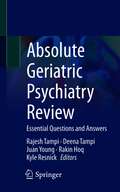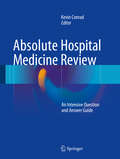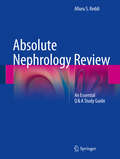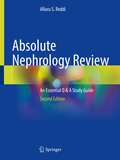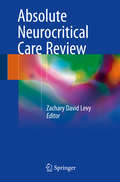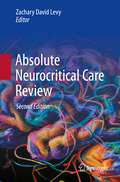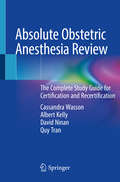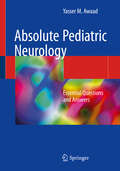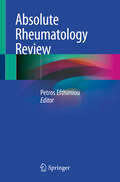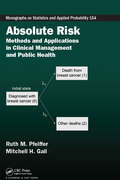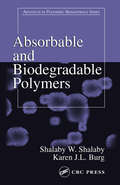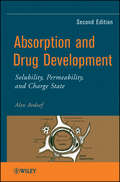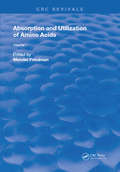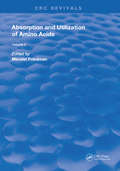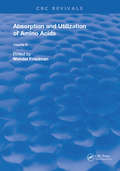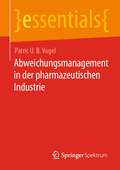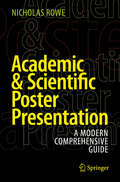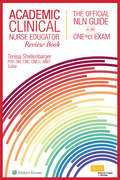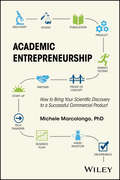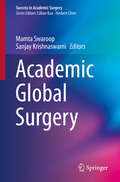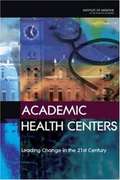- Table View
- List View
Absolute Geriatric Psychiatry Review: Essential Questions and Answers
by Rajesh Tampi Deena Tampi Juan Young Rakin Hoq Kyle ResnickThis book provides a comprehensive yet concise review of geriatric psychiatry in preparation for the board exam, or for reference during practice. Written by experts in the field, this text thoroughly reviews over 500 developmental, biological, diagnostic, and treatment questions for board certification. Unlike any other text on the market, this book takes a broader approach to the subject, making it accessible for physicians as well as other clinicians, including nurses, therapists, and social workers. Absolute Geriatric Psychiatry Review is an excellent resource for all clinicians who will care for the mental health of aging patients, including psychiatrists, neurologists, psychologists, therapists, nurses, social workers, nursing home administrators, and all others.
Absolute Hospital Medicine Review: An Intensive Question & Answer Guide
by Kevin ConradHospital medicine has expanded beyond the practice of internal medicine to co-manage patients in the fields of orthopedics, neurosurgery and general surgery. This concise guide covers the evolution and expanding scope of hospital medicine and the variety of clinical, ethical and administrative situations a Hospitalist encounters. 500 questions on inpatient care, co-management of patients and hospital system management are provided with the goal of assessing clinical and academic competency. Questions feature actual cases with evidence-based solutions. Useful to physicians, house staff and advanced nurse practitioners, this up-to-date referenced learning text encompasses all aspects of hospital care.
Absolute Nephrology Review: An Essential Q & A Study Guide
by Alluru S. ReddiWritten in a succinct question and answer format, this comprehensive resource covers all areas of nephrology and common clinical scenarios. Nearly 1000 questions with detailed answers provide nephrology fellows, practicing nephrologists and clinicians a better understanding of nephrology and aid preparations for nephrology and internal medicine boards. Absolute Nephrology Review features the latest evidence and guidelines while fulfilling a critical need within the nephrology community.
Absolute Nephrology Review: An Essential Q & A Study Guide
by Alluru S. ReddiWritten in a succinct question and answer format, this comprehensive book is a resource on all areas of nephrology and common clinical scenarios. The updated volume covers the basic physiology of fluids, electrolytes and acid-base problems, renal disorders and management, chronic kidney disease, hypertension, and other essential subjects. The nearly 1000 detailed questions and answers prepare readers for nephrology and internal medicine boards and provide a better understanding of nephrology as a whole. This new edition of Absolute Nephrology Review features the latest evidence and guidelines needed by nephrology fellows, practicing nephrologists, and clinicians.
Absolute Neurocritical Care Review
by Zachary David LevyThis practical question and answer book covers topics within the field of neurocritical care, including aspects of neurology, neurosurgery, general critical care, and emergency medicine. Each chapter serves as a standalone test, comprised of approximately 100 questions, and closely mimics the tone and scope of the United Council for Neurologic Subspecialties (UCNS) certification exam in neurocritical care. Rationale and discussion are provided in the answers section at the end of each exam. This practical study guide will help prepare critical care fellows and residents from a variety of backgrounds (including internal medicine, neurology, anesthesiology, and emergency medicine) for the UCNS exam.
Absolute Neurocritical Care Review
by Zachary David LevyThis practical question and answer book covers topics within the field of neurocritical care, including aspects of neurology, neurosurgery, general critical care, and emergency medicine. The updated second edition, with hundreds of new and revised test items, contains two full length practice exams that mimic the tone and scope of the recently introduced American Board of Psychiatry and Neurology (ABPN) certifying exam in Neurocritical Care, based on approval from the American Board of Medical Specialties (ABMS). At the conclusion of each exam, answer choices, rationale, and references are provided. The book is geared towards critical care fellows, but may also be useful for residents in the fields of neurology, neurosurgery, emergency medicine, and internal medicine.
Absolute Obstetric Anesthesia Review: The Complete Study Guide for Certification and Recertification
by Cassandra Wasson Albert Kelly David Ninan Quy TranThis concise, easy to follow review of obstetric anesthesia follows the outline set forth by the American Board of Anesthesiology (ABA), making it an invaluable resource for in-service exam and board exams. The book is divided into four sections, beginning with maternal physiology, followed by maternal-fetal considerations, then pathophysiology of complicated pregnancy, and finally problems of term and delivery. Written at the fellow-level, it provides anesthesiology residents, obstetric anesthesiology fellows, and any anesthesiologist providing care to obstetric patients testable information for the boards, as well as practical tips for clinical practice.
Absolute Pediatric Neurology: Essential Questions and Answers
by Yasser M. AwaadThis practical book features more than 1000 questions and answers with illustrations for pediatric neurologists, adult neurologists, general pediatricians and students taking their initial board examination and maintenance of certification. All questions are in multiple choice format and followed by the correct answer with a full explanation and appropriate references. Chapters are sectioned by different topics in pediatric neurology, including Epilepsy, Metabolic Disorders and Movement Disorders and other topics. Timely and thorough, this is a handy and succinct resource.
Absolute Rheumatology Review
by Petros EfthimiouThis book provides a concise and up-to-date review of key rheumatology topics along with extensive practice questions to assist in preparing for the American Board of Internal Medicine (ABIM) Rheumatology Certification Exam.Each chapter focuses on a single disease and starts with a short review (primarily tables and figures) to highlight the main points and key issues. The review is followed by 10-20 board-style multiple choice questions with detailed explanations for each topic. The chapters and associated preparation questions are written by established experts from top institutions in the United States. The book concludes with a 50-question practice test reflecting the format used by the ABIM Board Certification Exam.Absolute Rheumatology Review is an essential resource for not only graduate students, residents, and fellows in rheumatology and internal medicine studying for board exams but also rheumatologists, physicians, and related professionals preparing for recertification.
Absolute Risk: Methods and Applications in Clinical Management and Public Health (Chapman & Hall/CRC Monographs on Statistics and Applied Probability)
by Ruth M. Pfeiffer Mitchell H. GailAbsolute Risk: Methods and Applications in Clinical Management and Public Health provides theory and examples to demonstrate the importance of absolute risk in counseling patients, devising public health strategies, and clinical management. The book provides sufficient technical detail to allow statisticians, epidemiologists, and clinicians to build, test, and apply models of absolute risk. Features: Provides theoretical basis for modeling absolute risk, including competing risks and cause-specific and cumulative incidence regression Discusses various sampling designs for estimating absolute risk and criteria to evaluate models Provides details on statistical inference for the various sampling designs Discusses criteria for evaluating risk models and comparing risk models, including both general criteria and problem-specific expected losses in well-defined clinical and public health applications Describes many applications encompassing both disease prevention and prognosis, and ranging from counseling individual patients, to clinical decision making, to assessing the impact of risk-based public health strategies Discusses model updating, family-based designs, dynamic projections, and other topics Ruth M. Pfeiffer is a mathematical statistician and Fellow of the American Statistical Association, with interests in risk modeling, dimension reduction, and applications in epidemiology. She developed absolute risk models for breast cancer, colon cancer, melanoma, and second primary thyroid cancer following a childhood cancer diagnosis. Mitchell H. Gail developed the widely used "Gail model" for projecting the absolute risk of invasive breast cancer. He is a medical statistician with interests in statistical methods and applications in epidemiology and molecular medicine. He is a member of the National Academy of Medicine and former President of the American Statistical Association. Both are Senior Investigators in the Division of Cancer Epidemiology and Genetics, National Cancer Institute, National Institutes of Health.
Absorbable and Biodegradable Polymers (Advances In Polymeric Biomaterials Ser.)
by Shalaby W. Shalaby Karen J.L. BurgInterest in biodegradable and absorbable polymers is growing rapidly in large part because of their biomedical implant and drug delivery applications. This text illustrates creative approaches to custom designing unique, fiber-forming materials for equally unique applications. It includes an example of the development and application of a new absor
Absorption and Drug Development: Solubility, Permeability, and Charge State
by Alex AvdeefExplains how to perform and analyze the results of the latest physicochemical methodsWith this book as their guide, readers have access to all the current information needed to thoroughly investigate and accurately determine a compound's pharmaceutical properties and their effects on drug absorption. The book emphasizes oral absorption, explaining all the physicochemical methods used today to analyze drug candidates. Moreover, the author provides expert guidance to help readers analyze the results of their studies in order to select the most promising drug candidates.This Second Edition has been thoroughly updated and revised, incorporating all the latest research findings, methods, and resources, including:Descriptions and applications of new PAMPA models, drawing on more than thirty papers published by the author's research groupTwo new chapters examining permeability and Caco-2/MDCK and permeability and the blood-brain barrierExpanded information and methods to support pKa determinationNew examples explaining the treatment of practically insoluble test compoundsAdditional case studies demonstrating the use of the latest physicochemical techniquesNew, revised, and expanded database tables throughout the bookWell over 200 drawings help readers better understand difficult concepts and provide a visual guide to complex procedures. In addition, over 800 references serve as a gateway to the primary literature in the field, facilitating further research into all the topics covered in the book.This Second Edition is recommended as a reference for researchers in pharmaceutical R&D as well as in agrochemical, environmental, and other related areas of research. It is also recommended as a supplemental text for graduate courses in pharmaceutics.
Absorption and Utilization of Amino Acids: Volume I
by Mendel FriedmanContaining 45 papers written by outstanding international authors from 14 countries, this three-volume compendium brings together the elements needed to understand the factors which influence the utilization of amino acids. The wide-ranging topics include descriptions of metabolic pathways and mechanisms of the biological utilization of amino acids, as well as factors that influence amino acid bioavailability in enteral and parenteral nutrition. The use of amino acids to improve the quality and safety of the diet is presented. Also discussed are amino acid precursors of biogenic amines and the role of amino acids in atherosclerosis, cancer, and immunity. Scientists from many disciplines will benefit from this broad overview.
Absorption and Utilization of Amino Acids: Volume II
by Mendel FriedmanContaining 45 papers written by outstanding international authors from 14 countries, this three-volume compendium brings together the elements needed to understand the factors which influence the utilization of amino acids. The wide-ranging topics include descriptions of metabolic pathways and mechanisms of the biological utilization of amino acids, as well as factors that influence amino acid bioavailability in enteral and parenteral nutrition. The use of amino acids to improve the quality and safety of the diet is presented. Also discussed are amino acid precursors of biogenic amines and the role of amino acids in atherosclerosis, cancer, and immunity. Scientists from many disciplines will benefit from this broad overview.
Absorption and Utilization of Amino Acids: Volume III
by Mendel FriedmanContaining 45 papers written by outstanding international authors from 14 countries, this three-volume compendium brings together the elements needed to understand the factors which influence the utilization of amino acids. The wide-ranging topics include descriptions of metabolic pathways and mechanisms of the biological utilization of amino acids, as well as factors that influence amino acid bioavailability in enteral and parenteral nutrition. The use of amino acids to improve the quality and safety of the diet is presented. Also discussed are amino acid precursors of biogenic amines and the role of amino acids in atherosclerosis, cancer, and immunity. Scientists from many disciplines will benefit from this broad overview.
Abundance (Spectacular Fiction)
by Michael FineJulia is an American medical doctor fleeing her own privileged background todeliver health care to remote African communities, where her skills really make a difference. Carl is also an American, whose experiences as a black man in the United States have led him to volunteer in Africa. The two come together as colleagues (and lovers) as Liberia is gripped in a brutal civil war. Then Julia is kidnapped by child soldiers on a remote jungle road, and Carl is "rescued" and evacuated against his will by U.S. Marines. Back in the U.S., Carl turns to a Rhode Island doctor who has been a mentor to them both. With the help of a smuggler, they return to Africa illegally and begin the dangerous work of finding and rescuing Julia. This is an unforgettable thriller grounded in real events. A short preface and several appendices add background on Liberia's complex U.S.-linked history, and a glossary illuminates Liberia's colorful Kreyol patois.
Abusive Personality, Second Edition
by K. O'Leary Donald DuttonThis influential book provides an innovative framework for understanding and treating intimate partner violence. Integrating a variety of theoretical and empirical perspectives, Donald G. Dutton demonstrates that male abusiveness is more than just a learned pattern of behavior--it is the outgrowth of a particular personality configuration. He illuminates the development of the abusive personality from early childhood to adulthood and presents an evidence-based treatment approach designed to meet this population's unique needs. The second edition features two new chapters on the neurobiological roots of abusive behavior and the development of abusiveness in females.
Abusive Policies: How the American Child Welfare System Lost Its Way (Studies in Social Medicine)
by Mical RazIn the early 1970s, a new wave of public service announcements urged parents to "help end an American tradition" of child abuse. The message, relayed repeatedly over television and radio, urged abusive parents to seek help. Support groups for parents, including Parents Anonymous, proliferated across the country to deal with the seemingly burgeoning crisis. At the same time, an ever-increasing number of abused children were reported to child welfare agencies, due in part to an expansion of mandatory reporting laws and the creation of reporting hotlines across the nation. Here, Mical Raz examines this history of child abuse policy and charts how it changed since the late 1960s, specifically taking into account the frequency with which agencies removed African American children from their homes and placed them in foster care. Highlighting the rise of Parents Anonymous and connecting their activism to the sexual abuse moral panic that swept the country in the 1980s, Raz argues that these panics and policies—as well as biased viewpoints regarding race, class, and gender—played a powerful role shaping perceptions of child abuse. These perceptions were often directly at odds with the available data and disproportionately targeted poor African American families above others.
Abweichungsmanagement in der pharmazeutischen Industrie (essentials)
by Patric U. VogelDas Abweichungsmanagement ist eines von vielen Qualitätssystemen in pharmazeutischen Unternehmen. Der pharmazeutische Prozess, von der Beschaffung von Ausgangsstoffen bis zur Fertigung des Endprodukts, erfolgt über Wochen und teils Monate gemäß schriftlichen Arbeitsanweisungen, deren korrekte Ausführung eine konsistente Produktqualität sicherstellen. Bei all diesen Schritten können unerwartet Abweichungen von den festgelegten Prozeduren auftreten. Diese müssen dokumentiert und hinsichtlich des möglichen Einflusses auf die Produktqualität und die Patientensicherheit bewertet werden. Weiterhin sollte die Ursache für die Abweichung identifiziert werden, um die Fehlerquelle durch geeignete Maßnahmen abstellen zu können. Regelmäßige Trendanalysen wichtiger Kennzahlen helfen ferner, die Situation bei Abweichungen zu überwachen.
Academia and the World Beyond: Navigating Life after a PhD
by Christopher R. MadanA common question posed to PhD students from friends and family is, “What will you do after?” But many students are too focused on the PhD itself and have not yet had a chance to sufficiently think about post-PhD life. This book is a collection of 22 interviews with those have completed a PhD and then are now in an academic position or another career path. In either case, they have all been successful and have a multitude of insights to share with those who are interested in considering a variety of careers. Academic careers share many commonalities with many non-academic careers, with skills learned within academia being valuable in other career paths as well. Nearly all the individuals interviewed here have been on the job market recently and understand today's job climate. No other book on the market includes the diversity of perspectives presented here. In particular, the focus on psychology and neuroscience draws from a variety of individuals that have similar training but have nonetheless taken divergent paths.
Academic & Scientific Poster Presentation: A Modern Comprehensive Guide
by Nicholas RoweThis book offers the first comprehensive guide to poster presentation at academic, scientific and professional conferences. Each chapter explores different factors that impact upon how posters function, and how they fit within today's conference practices, as well as provides guidance on how to address compilation and presentation issues with the poster medium. Drawing from fields of education, psychology, advertising and other areas, the book offers examples of how theories may be applied to practice in terms of both traditional paper and electronic poster formats. Importantly, the book offers a critical examination of how academic and scientific posters are able to achieve their potential for knowledge dissemination, networking and knowledge transfer. The many new and challenging findings provide an evidence-based approach to help both novice and experienced presenters compile effective poster presentations, and to see how poster presentations can best be used to share knowledge, facilitate networking, and promote dialogue. Additionally, educators, employers, and conference organizers may use this book to re-evaluate how conferences meet the needs of today's globally connected peer groups, and the benefit they provide at individual and group levels.
Academic Clinical Nurse Educator Review Book: The Official NLN Guide to the CNE®cl Exam
by Teresa ShellenbargerThis official NLN guide is the only preparation book for the NLN Certified Academic Clinical Nurse Educator Examination (CNE®cl) that aligns with the NLN core competencies for academic clinical nurse educators and the test blueprint, giving you a competitive advantage. More than 500 multiple-choice questions with accompanying rationales provide essential review of test content and identify areas requiring further study, providing the preparation you need to excel on your exam. “Earning the CNE®cl certification demonstrates the nurse educator’s commitment to excellence and professional expertise in the role of an academic clinical nurse educator.”
Academic Entrepreneurship: How to Bring Your Scientific Discovery to a Successful Commercial Product
by Michele MarcolongoThe pathway to bringing laboratory discoveries to market is poorly understood and generally new to many academics. This book serves as an easy-to-read roadmap for translating technology to a product launch – guiding university faculty and graduate students on launching a start-up company.• Addresses a growing trend of academic faculty commercializing their discoveries, especially those supported by the National Science Foundation and National Institutes of Health• Offers faculty a pathway and easy-to-follow steps towards determining whether their discovery / idea / technology is viable from a business perspective, as well as how to execute the necessary steps to create and launch a start-up company• Has a light-hearted and accessible style of a step-by-step guide to help graduate students, post-docs, and faculty learn how to go about spinning out their research from the lab• Includes interviews by faculty in the disciplines of materials science, pharmaceuticals, medical devices, information technology, energy, and mechanical devices – offering tips and discussing potential pitfalls to be avoided
Academic Global Surgery: Academic Global Surgery (Success in Academic Surgery)
by Mamta Swaroop Sanjay KrishnaswamiThis seventh book in the series of Success in Academic Surgery look to sustain the field and facilitate the next generation of leaders in Academic Global Surgery. It brings together a catalogue of current knowledge, needs, and pathways to a career in the field. Academic Global Surgery involves educational, research and clinical collaborations between academic humanitarian surgeons in high-income countries (HIC), their low and middle-income country (LMIC) partners and their respective academic institutions. The goal of these collaborations is improving understanding of surgical disease, and increasing access to and capacity for surgical care in resource-poor regions. In the last few years, the rapid exchange of ideas through social media and other technologies has combined with an increasing appreciation of worldwide health disparities to put the issue of global health at the forefront of our consciousness. Although traditionally neglected within public health initiatives, surgical disease is now recognized as a major contributor to death and disability worldwide, while surgical therapy in resource-poor areas is increasingly being shown to be cost-effective. In response to this growing recognition, what began as mission trips and short-term clinical volunteerism in the developing world has evolved into a burgeoning new field with a broader scope. While the tremendous recent interest from medical students and residents in Globa l Surgery has stimulated an exponential growth of interest in this field, current surgical literature has highlighted the need for further development and delineation of this new discipline within academic surgery.
Academic Health Centers: Leading Change in the 21st Century
by Institute of Medicine of the National AcademiesAcademic health centers are currently facing enormous changes that will impact their roles in education, research, and patient care. The aging and diversity of the population will create new health care needs and demands, while rapid advances in technology will fundamentally alter the health care systems' capabilities. Pressures on health care costs, growth of the uninsured, and evidence of quality problems in health care will create a challenging environment that demands change. "Academic Health Centers explores how AHCs will need to redirect each of their roles so they are able to meet the burgeoning challenges of health care and to improve the health of the people they serve. The methods and approaches used in preparing health professionals, the relationship among the variety of their research programs, and the design of clinical care will all need examination if they are to meet the changing demands of the coming decades. Policymakers and payers will need to create incentives to support innovation and change in AHCs. In response, AHCs will need to increase the level of coordination and integration across their roles and the individual organizations that comprise the AHC if they are to successfully undertake the types of changes needed. Academic Health Centers lays out a strategy to start a continuing and long-term process of change.
